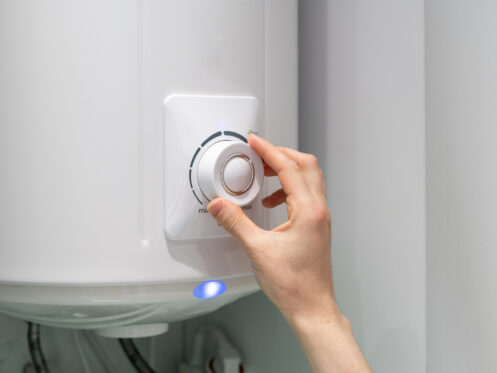Boilers are essential heating systems used in residential properties to provide warmth and hot water. They come in various types, each designed to meet specific heating requirements. Understanding the different types of boilers can help you decide when to select the right one for your home. Let’s explore the various boiler types and their features.
Combi Boilers
Combi boilers, also known as combination boilers, are a type of central heating and hot water system commonly used in residential properties. Unlike traditional boilers that require separate tanks or cylinders to store hot water, combi boilers integrate the functions of a central heating boiler and a water heater into a single compact unit.
One of the main advantages of combi boilers is their efficiency in providing hot water on demand. As the name suggests, they combine heating and hot water systems, allowing users to enjoy instant hot water whenever needed. This eliminates the need for a separate water storage tank, reducing heat loss and increasing energy efficiency. Combi boilers heat water directly from the mains supply, ensuring a constant and unlimited hot water supply.
Another benefit of combi boilers is their compact size and installation versatility. Since they do not require additional tanks or cylinders, combi boilers take up less space compared to traditional systems. This can be particularly advantageous for smaller properties or apartments where space is limited. Additionally, the absence of a storage tank simplifies the installation process, making combi boilers a popular choice for retrofitting or upgrading existing heating systems.
However, it’s essential to consider some potential drawbacks of combi boilers. Firstly, their reliance on the main water supply means that water pressure may vary depending on the demand in the area. In areas with low water pressure, users may experience reduced flow rates or fluctuations in the hot water supply. This can be mitigated by installing a separate water pump or choosing a combi boiler model specifically designed for low water pressure environments.
Furthermore, since combi boilers heat water on demand, their capacity to supply hot water simultaneously to multiple outlets may be limited. The water flow and temperature may be affected if several taps or showers are used simultaneously. This consideration is essential for larger households where multiple hot water outlets may be used concurrently. In such cases, it may be necessary to install a system with a higher output capacity or consider alternative options, such as a system boiler with a separate hot water cylinder.
System Boilers
System boilers, also known as sealed system boilers, work by heating water and storing it in a hot water cylinder, providing hot water to taps and showers, and supplying water for central heating systems. Unlike conventional boilers, system boilers incorporate key components within the unit, including an expansion vessel and pump, eliminating the need for a separate cold water tank in the attic or loft.
One of the main advantages of a system boiler is its compact design, which makes it an attractive option for homes with limited space. The absence of a cold water tank also means that system boilers are suitable for properties with low water pressure, as they rely on the main water supply. This feature ensures a strong and consistent flow of hot water throughout the house.
Another benefit of system boilers is that they provide a quick and efficient hot water supply. The pre-heated water stored in the cylinder allows for almost instantaneous hot water delivery, eliminating the need to wait for the water to heat up. This is particularly advantageous for households with multiple bathrooms or high hot water demands.
System boilers are often considered more energy-efficient compared to traditional boilers. Incorporating an expansion vessel and pump within the unit enables better control of water pressure, resulting in reduced energy wastage. Additionally, system boilers can be compatible with renewable energy sources such as solar thermal systems, enhancing their eco-friendly credentials.
Despite their advantages, there are a few considerations to keep in mind when opting for a system boiler. Installation costs tend to be higher compared to combi boilers, as they require additional components such as a hot water cylinder and associated pipework. This can make system boilers a less cost-effective option for smaller properties or households with lower hot water demands.
Furthermore, the reliance on a hot water cylinder means that system boilers may not be suitable for properties with limited storage space. The cylinder needs to be adequately sized to meet the household’s hot water needs, and its location should be carefully considered during the installation process.
Conventional Boilers
Conventional boilers, also known as regular or traditional boilers, are a type of central heating system commonly found in older homes. They work by heating water in a storage tank, which is then distributed throughout the house to provide heat and hot water. Conventional boilers have been widely used for many years and have a simple design that relies on the principles of convection.
The main components of a conventional boiler system include a boiler unit, a hot water storage tank, and a separate cold water tank. The boiler unit is responsible for heating the water stored in the hot water tank. When a tap or a heating system is activated, the heated water is drawn from the storage tank and distributed throughout the house.
One of the advantages of conventional boilers is their compatibility with existing heating systems. They can easily be integrated into older setups, making them popular for retrofitting projects. Additionally, conventional boilers can simultaneously provide hot water to multiple taps, making them suitable for larger households with higher hot water demands.
However, there are some drawbacks to conventional boilers. Firstly, they can be less energy-efficient compared to modern boiler types. Heat loss can occur as the system involves storing hot water, reducing overall efficiency. Additionally, conventional boilers often take up more space due to the need for separate tanks, which may limit installation options, especially in smaller properties.
Maintenance of conventional boilers is also a consideration. The tanks and pipework need to be checked and serviced regularly to ensure optimal performance and prevent leaks or corrosion. These maintenance requirements can add to the overall cost of owning a conventional boiler system.
Factors to Consider When Choosing a Boiler
When choosing a boiler, several essential factors must be considered to ensure that it meets your specific requirements and provides efficient and reliable heating. Firstly, the size and capacity of the boiler should be carefully evaluated. It is crucial to calculate the heat load of your property to determine the appropriate boiler size. Factors such as the square footage, insulation, number of rooms, and hot water demand must be considered. An undersized boiler will struggle to meet your heating needs, while an oversized one may waste energy and lead to higher costs.
Additionally, the type of fuel available and its cost should be considered. Boilers can run on various fuels, including natural gas, oil, electricity, or renewable energy sources. Assessing the availability, cost, and environmental impact of different fuel options will help you make an informed decision.
Secondly, the efficiency and performance of the boiler play a significant role. Look for boilers with high-efficiency ratings, as they will consume less fuel and result in lower energy bills. Efficiency ratings are typically expressed as an annual fuel utilization efficiency (AFUE) percentage, indicating how much fuel is converted into heat. It is also essential to consider the reliability and durability of the boiler.
Call the Professionals Today!
Are you tired of sweltering summers and freezing winters? Look no further! At John Henry's Plumbing, Heating, Air, and Electrical, we are your one-stop solution for all your cooling, plumbing, and heating needs. Serving Lincoln and the surrounding areas, we guarantee exceptional craftsmanship and prompt response times. Call John Henry's Plumbing, Heating, Air, and Electrical today to learn more about our services.

